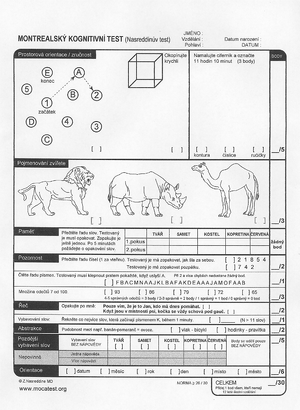Montreal Cognitive Test
The Montreal Cognitive Assessment (MoCA, also Nasreddin's test) was developed in 1996 by a Canadian specialist in cognitive disorders and Alzheimer's disease, Dr. Ziad Nasreddine, and subsequently published it in 2005 (Nasreddineet al., 2005). It was introduced to the Czech environment in 2006 by J. Reban. Currently, there is already a seventh version of the original test, which can be freely obtained in 55 different languages. This test, together with others such as the MMSE ("Minimental State Examination"), the Addenbrooke's cognitive test or the "7-minute" test, is among the cognitive screening tests used to diagnose dementia. Currently, the MoCA test is still used more as a supplement to the MMSE test.
Usage[edit | edit source]
MoCA has a relatively wide range of uses, as it evaluates multiple cognitive domains, and thus can be useful in the detection of various neurological diseases. It is mainly used in the detection of the early phase of Alzheimer's dementia and mild cognitive impairment, but also Parkinson's disease, Huntington's disease, vascular cognitive disorders, brain metastases, primary brain tumors, multiple sclerosis, depression, schizophrenia, etc.
Structure[edit | edit source]
The test takes approximately ten minutes to complete and a maximum of 30 points can be obtained. The following cognitive abilities are assessed: dexterity (connecting numbers), spatial orientation (drawing a cube), visual construction skills (drawing a clock and marking a certain time), naming an animal, memory, attention, repeating sentences, recalling words, abstraction, later acquisition of words, orientation.
Results[edit | edit source]
People with Alzheimer's have the lowest scores on most abilities. In persons with mild cognitive impairment, attention is not impaired, but scores on other items are also low. We observe the highest scores in cognitively healthy individuals. With a MoCA value < 26 points, the sensitivity for determining dementia is 90% and the specificity is 87%. Compared to the primary screening cognitive test MMSE, the MoCA additionally evaluates frontal functions, and a more detailed evaluation is found in memory and visual-spatial functions. Czech MoCA standards for older adults were also published with a conversion between the MoCA test and the MMSE. Test-retest reliability index data are also available.
Links[edit | edit source]
Related articles[edit | edit source]
External links[edit | edit source]
Literature[edit | edit source]
- Wikipedia contributors. Montreal Cognitive Assessment [online]. From Wikipedia, the free encyclopedia, ©2016. [cit. 2016-11-06]. <https://en.wikipedia.org/wiki/Montreal_Cognitive_Assessment>.
- DOC. MUDR. REKTOROVÁ, PH.D, Irena. Screeningové škály pro hodnocení demence. Neurologie pro praxi [online]. 2011, y. 12, vol. 12, p. 1,5,7, Available from <http://www.neurologiepropraxi.cz/pdfs/neu/2011/92/11.pdf>. ISSN 1803-5280.
References[edit | edit source]
- Nasreddine,Z. S., Phillips, N. A., Bedirian, V., Charbonneau, S., Whitehead, V., Collin,I.,…Chertkow, H. (2005). The Montreal cognitive assessment, MoCA: A brief screening tool for mild cognitive impairment. Journal of the American Geriatric Society,53(4), 695–699. doi:10.1111/j.1532-5415.2005.53221.x
- ↑ Reban J. (2006) Montrealský kognitivni test /MoCA/: přínos k diagnostice predemencí. Česká Geriatrická Revue (4):224-229.
- ↑ REKTOROVÁ,, Irena. Screeningové škály pro hodnocení demence. Neurologie pro praxi [online]. 2011, roč. 12, vol. 12, s. 39, dostupné také z <http://www.neurologiepropraxi.cz/pdfs/neu/2011/92/11.pdf>. ISSN 1803-5280.
- ↑ Kopecek, M., Stepankova, H., Lukavsky, J., Ripova, D., Nikolai, T., & Bezdicek, O. (2017). Montreal Cognitive Assessment (MoCA): Normative Data for Old and Very Old Czech Adults. Applied Neuropsychology: Adult, 24(1), 23-29. On-line first May 4, 2016. doi: 10.1080/23279095.2015.1065261
- ↑ Kopecek, M., Bezdicek, O., Sulc, Z., Lukavsky,J., & Stepankova, H. (2016). Montreal Cognitive Assessment and Mini-Mental State Examination Reliable Change Indices in Healthy Older Adults. International Journal of Geriatric Psychiatry, on-line first June 29. doi: 10.1002/gps.4539

